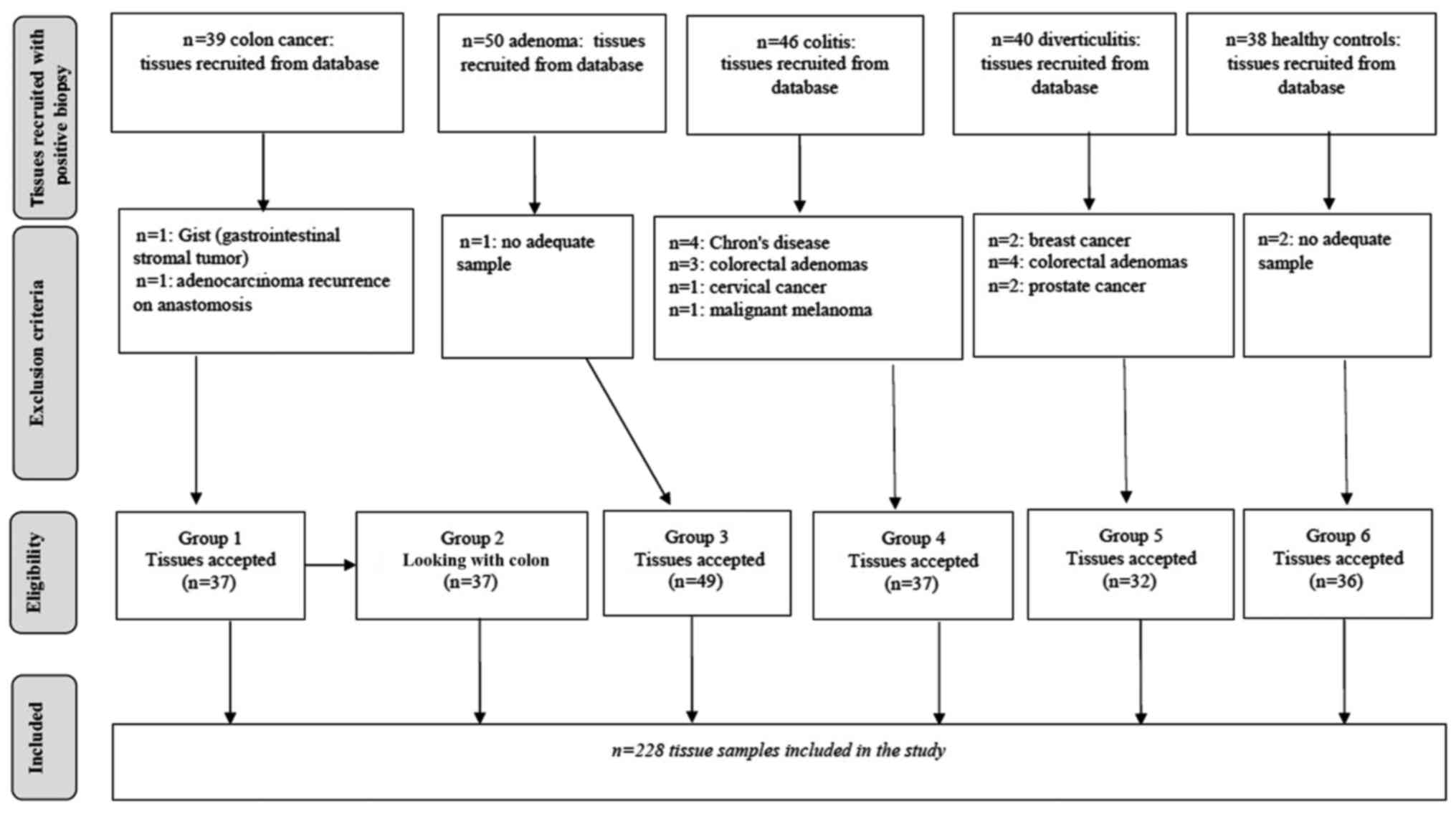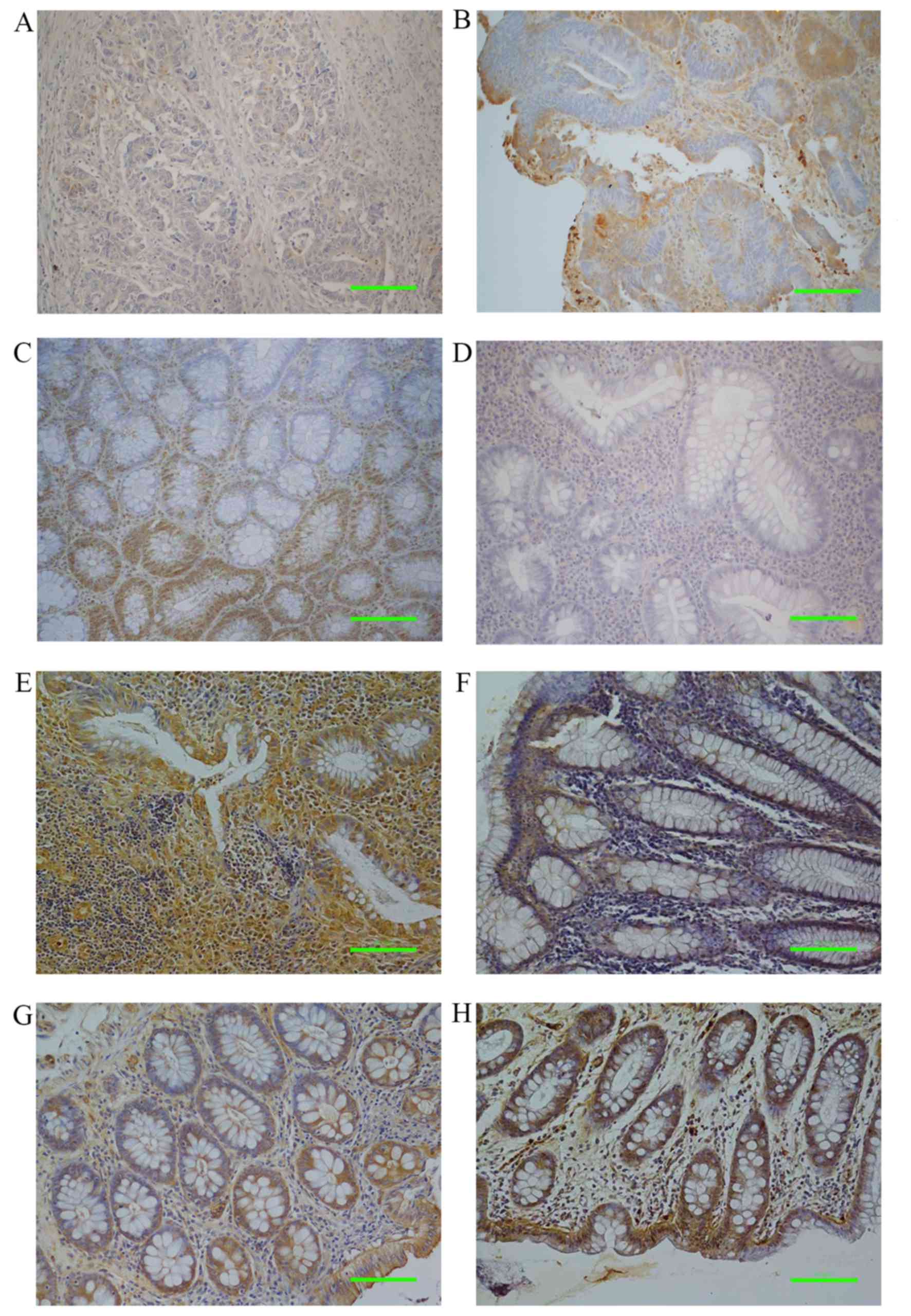|
1
|
Altobelli E, Lattanzi A, Paduano R,
Varassi G and di Orio F: Colorectal cancer prevention in Europe:
Burden of disease and status of screening programs. Prev Med.
62:132–141. 2014. View Article : Google Scholar : PubMed/NCBI
|
|
2
|
Altobelli E, D'Aloisio F and Angeletti PM:
Colorectal cancer screening in countries of European Council
outside of the EU-28. World J Gastroenterol. 22:4946–4957. 2016.
View Article : Google Scholar : PubMed/NCBI
|
|
3
|
Ferlay J, Soerjomataram I, Dikshit R, Eser
S, Mathers C, Rebelo M, Parkin DM, Forman D and Bray F: Cancer
incidence and mortality worldwide: Sources, methods and major
patterns in GLOBOCAN 2012. Int J Cancer. 136:E359–E386. 2015.
View Article : Google Scholar : PubMed/NCBI
|
|
4
|
Pawa N, Arulampalam T and Norton JD:
Screening for colorectal cancer: Established and emerging
modalities. Nat Rev Gastroenterol Hepatol. 8:711–722. 2011.
View Article : Google Scholar : PubMed/NCBI
|
|
5
|
Rubenstein JH, Enns R, Heidelbaugh J,
Barkun A, Adams MA, Dorn SD, Dudley-Brown SL, Flamm SL, Gellad ZF,
Gruss CB, et al: Clinical Guidelines Committee: American
Gastroenterological Association Institute Guideline on the
Diagnosis and Management of Lynch Syndrome. Gastroenterology.
149:777–782, quiz e16-e17. 2015. View Article : Google Scholar : PubMed/NCBI
|
|
6
|
Samadder NJ, Jasperson K and Burt RW:
Hereditary and common familial colorectal cancer: Evidence for
colorectal screening. Dig Dis Sci. 60:734–747. 2015. View Article : Google Scholar : PubMed/NCBI
|
|
7
|
Sebastian S, Hernández V, Myrelid P, Kariv
R, Tsianos E, Toruner M, Marti-Gallostra M, Spinelli A, van der
Meulen-de Jong AE, Yuksel ES, et al: Colorectal cancer in
inflammatory bowel disease: Results of the 3rd ECCO pathogenesis
scientific workshop (I). J Crohns Colitis. 8:5–18. 2014. View Article : Google Scholar : PubMed/NCBI
|
|
8
|
Parian A and Lazarev M: Who and how to
screen for cancer in at-risk inflammatory bowel disease patients.
Expert Rev Gastroenterol Hepatol. 9:731–746. 2015.PubMed/NCBI
|
|
9
|
Breynaert C, Vermeire S, Rutgeerts P and
Van Assche G: Dysplasia and colorectal cancer in inflammatory bowel
disease: A result of inflammation or an intrinsic risk? Acta
Gastroenterol Belg. 71:367–372. 2008.PubMed/NCBI
|
|
10
|
Brenner H, Hoffmeister M, Stegmaier C,
Brenner G, Altenhofen L and Haug U: Risk of progression of advanced
adenomas to colorectal cancer by age and sex: Estimates based on
840,149 screening colonoscopies. Gut. 56:1585–1589. 2007.
View Article : Google Scholar : PubMed/NCBI
|
|
11
|
Kuntz KM, Lansdorp-Vogelaar I, Rutter CM,
Knudsen AB, van Ballegooijen M, Savarino JE, Feuer EJ and Zauber
AG: A systematic comparison of microsimulation models of colorectal
cancer: The role of assumptions about adenoma progression. Med
Decis Making. 31:530–539. 2011. View Article : Google Scholar : PubMed/NCBI
|
|
12
|
Terzić J, Grivennikov S, Karin E and Karin
M: Inflammation and colon cancer. Gastroenterology.
138:2101–2114.e5. 2010. View Article : Google Scholar : PubMed/NCBI
|
|
13
|
Sakellakis M, Makatsoris T, Gkermpesi M,
Peroukidis S and Kalofonos H: Ulcerative colitis six years after
colon cancer: Only a coincidence? Int Med Case Rep J. 7:85–88.
2014. View Article : Google Scholar : PubMed/NCBI
|
|
14
|
Dyson JK and Rutter MD: Colorectal cancer
in inflammatory bowel disease: What is the real magnitude of the
risk? World J Gastroenterol. 18:3839–3848. 2012. View Article : Google Scholar : PubMed/NCBI
|
|
15
|
Herszényi L, Barabás L, Miheller P and
Tulassay Z: Colorectal cancer in patients with inflammatory bowel
disease: The true impact of the risk. Dig Dis. 33:52–57. 2015.
View Article : Google Scholar : PubMed/NCBI
|
|
16
|
O'Connor PM, Lapointe TK, Beck PL and
Buret AG: Mechanisms by which inflammation may increase intestinal
cancer risk in inflammatory bowel disease. Inflamm Bowel Dis.
16:1411–1420. 2010. View Article : Google Scholar : PubMed/NCBI
|
|
17
|
Azer SA: Overview of molecular pathways in
inflammatory bowel disease associated with colorectal cancer
development. Eur J Gastroenterol Hepatol. 25:271–281. 2013.
View Article : Google Scholar : PubMed/NCBI
|
|
18
|
Foersch S and Neurath MF:
Colitis-associated neoplasia: Molecular basis and clinical
translation. Cell Mol Life Sci. 71:3523–3535. 2014. View Article : Google Scholar : PubMed/NCBI
|
|
19
|
Hartnett L and Egan LJ: Inflammation, DNA
methylation and colitis-associated cancer. Carcinogenesis.
33:723–731. 2012. View Article : Google Scholar : PubMed/NCBI
|
|
20
|
Lipinska B, Zylicz M and Georgopoulos C:
The HtrA (DegP) protein, essential for Escherichia coli survival at
high temperatures, is an endopeptidase. J Bacteriol. 172:1791–1797.
1990. View Article : Google Scholar : PubMed/NCBI
|
|
21
|
Spiess C, Beil A and Ehrmann M: A
temperature-dependent switch from chaperone to protease in a widely
conserved heat shock protein. Cell. 97:339–347. 1999. View Article : Google Scholar : PubMed/NCBI
|
|
22
|
Zumbrunn J and Trueb B: Primary structure
of a putative serine protease specific for IGF-binding proteins.
FEBS Lett. 398:187–192. 1996. View Article : Google Scholar : PubMed/NCBI
|
|
23
|
Zhao Z, Li H, Wang C, Xu W, Sun J and Zhao
W: Serine protease HtrA1 as an inhibitor on proliferation invasion
and migration of gastric cancer. Med Oncol. 32:1122015. View Article : Google Scholar : PubMed/NCBI
|
|
24
|
Baldi A, De Luca A, Morini M, Battista T,
Felsani A, Baldi F, Catricalà C, Amantea A, Noonan DM, Albini A, et
al: The HtrA1 serine protease is down-regulated during human
melanoma progression and represses growth of metastatic melanoma
cells. Oncogene. 21:6684–6688. 2002. View Article : Google Scholar : PubMed/NCBI
|
|
25
|
Grau S, Richards PJ, Kerr B, Hughes C,
Caterson B, Williams AS, Junker U, Jones SA, Clausen T and Ehrmann
M: The role of human HtrA1 in arthritic disease. J Biol Chem.
281:6124–6129. 2006. View Article : Google Scholar : PubMed/NCBI
|
|
26
|
Altobelli E, Marzioni D, Lattanzi A and
Angeletti PM: HtrA1: Its future potential as a novel biomarker for
cancer. Oncol Rep. 34:555–566. 2015.PubMed/NCBI
|
|
27
|
Weger M, Renner W, Steinbrugger I, Köfer
K, Wedrich A, Groselj-Strele A, El-Shabrawi Y, Schmut O and Haas A:
Association of the HTRA1 −625G>A promoter gene polymorphism with
exudative age-related macular degeneration in a Central European
population. Mol Vis. 13:1274–1279. 2007.PubMed/NCBI
|
|
28
|
Xia J, Wang F, Wang L and Fan Q: Elevated
serine protease HtrA1 inhibits cell proliferation, reduces
invasion, and induces apoptosis in esophageal squamous cell
carcinoma by blocking the nuclear factor-κB signaling pathway.
Tumour Biol. 34:317–328. 2013. View Article : Google Scholar : PubMed/NCBI
|
|
29
|
Lorenzi T, Lorenzi M, Altobelli E,
Marzioni D, Mensà E, Quaranta A, Paolinelli F, Morroni M,
Mazzucchelli R, De Luca A, et al: HtrA1 in human urothelial bladder
cancer: A secreted protein and a potential novel biomarker. Int J
Cancer. 133:2650–2661. 2013.PubMed/NCBI
|
|
30
|
De Luca A, De Falco M, Severino A,
Campioni M, Santini D, Baldi F, Paggi MG and Baldi A: Distribution
of the serine protease HtrA1 in normal human tissues. J Histochem
Cytochem. 51:1279–1284. 2003. View Article : Google Scholar : PubMed/NCBI
|
|
31
|
Marzioni D, Lorenzi T, Altobelli E,
Giannubilo SR, Paolinelli F, Tersigni C, Crescimanno C, Monsurrò V,
Tranquilli AL, Di Simone N, et al: Alterations of maternal plasma
HTRA1 level in preeclampsia complicated by IUGR. Placenta.
33:1036–1038. 2012. View Article : Google Scholar : PubMed/NCBI
|
|
32
|
Zurawa-Janicka D, Skorko-Glonek J and
Lipinska B: HtrA proteins as targets in therapy of cancer and other
diseases. Expert Opin Ther Targets. 14:665–679. 2010. View Article : Google Scholar : PubMed/NCBI
|
|
33
|
Schmidt N, Irle I, Ripkens K, Lux V,
Nelles J, Johannes C, Parry L, Greenow K, Amir S, Campioni M, et
al: Epigenetic silencing of serine protease HTRA1 drives
polyploidy. BMC Cancer. 16:3992016. View Article : Google Scholar : PubMed/NCBI
|
|
34
|
Tiaden AN and Richards PJ: The emerging
roles of HTRA1 in musculoskeletal disease. Am J Pathol.
182:1482–1488. 2013. View Article : Google Scholar : PubMed/NCBI
|
|
35
|
Jiang J, Huang L, Yu W, Wu X, Zhou P and
Li X: Overexpression of HTRA1 leads to down-regulation of
fibronectin and functional changes in RF/6A cells and HUVECs. PLoS
One. 7:e461152012. View Article : Google Scholar : PubMed/NCBI
|
|
36
|
Triantafillidis JK, Nasioulas G and
Kosmidis PA: Colorectal cancer and inflammatory bowel disease:
Epidemiology, risk factors, mechanisms of carcinogenesis and
prevention strategies. Anticancer Res. 29:2727–2737.
2009.PubMed/NCBI
|
|
37
|
Ullman TA and Itzkowitz SH: Intestinal
inflammation and cancer. Gastroenterology. 140:1807–1816. 2011.
View Article : Google Scholar : PubMed/NCBI
|
|
38
|
Antoniou E, Margonis GA, Angelou A,
Zografos GC and Pikoulis E: Cytokine networks in animal models of
colitis-associated cancer. Anticancer Res. 35:19–24.
2015.PubMed/NCBI
|
|
39
|
Waldner MJ, Neurath MF and Markus M:
Cytokines in colitis associated cancer: Potential drug targets?
Inflamm Allergy Drug Targets. 7:187–194. 2008. View Article : Google Scholar : PubMed/NCBI
|
|
40
|
Goel GA, Kandiel A, Achkar JP and Lashner
B: Molecular pathways underlying IBD-associated colorectal
neoplasia: Therapeutic implications. Am J Gastroenterol.
106:719–730. 2011. View Article : Google Scholar : PubMed/NCBI
|
|
41
|
Ishiguro K, Yoshida T, Yagishita H, Numata
Y and Okayasu T: Epithelial and stromal genetic instability
contributes to genesis of colorectal adenomas. Gut. 55:695–702.
2006. View Article : Google Scholar : PubMed/NCBI
|
|
42
|
Clausen T, Southan C and Ehrmann M: The
HtrA family of proteases: Implications for protein composition and
cell fate. Mol Cell. 10:443–455. 2002. View Article : Google Scholar : PubMed/NCBI
|
|
43
|
Hou Y, Lin H, Zhu L, Liu Z, Hu F, Shi J,
Yang T, Shi X, Guo H, Tan X, et al: The inhibitory effect of IFN-γ
on protease HTRA1 expression in rheumatoid arthritis. J Immunol.
193:130–138. 2014. View Article : Google Scholar : PubMed/NCBI
|
|
44
|
Wu J, Liu W, Bemis A, Wang E, Qiu Y,
Morris EA, Flannery CR and Yang Z: Comparative proteomic
characterization of articular cartilage tissue from normal donors
and patients with osteoarthritis. Arthritis Rheum. 56:3675–3684.
2007. View Article : Google Scholar : PubMed/NCBI
|
|
45
|
Tomasello G, Tralongo P, Damiani P,
Sinagra E, Di Trapani B, Zeenny MN, Hussein IH, Jurjus A and Leone
A: Dismicrobism in inflammatory bowel disease and colorectal
cancer: Changes in response of colocytes. World J Gastroenterol.
20:18121–18130. 2014. View Article : Google Scholar : PubMed/NCBI
|
|
46
|
Hardy RG, Meltzer SJ and Jankowski JA: ABC
of colorectal cancer. Molecular basis for risk factors. BMJ.
321:886–889. 2000. View Article : Google Scholar : PubMed/NCBI
|
















